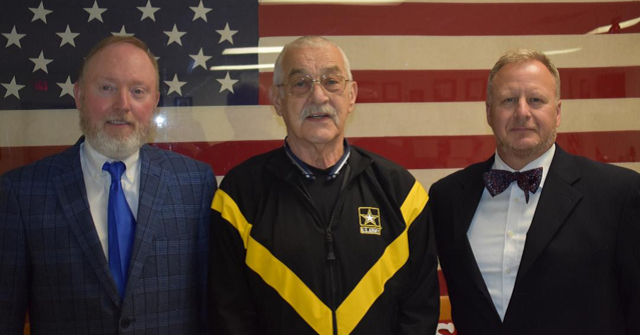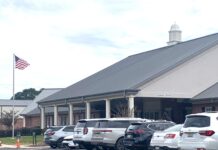Circuit Judge Gregory Nicholas, VFW Post 2214 Commander Will Harris and District Judge Rusty Turner are leading the drive to establish a Veterans Treatment Court in Cullman County. (Cullman Tribune file photo)
CULLMAN, Ala. – In their continuing efforts to establish a Veterans Treatment Court in Cullman County, Circuit Judge Gregory Nicholas and District Judge Rusty Turner, along with Cullman VFW Post 2214, are seeking to recruit mentors–especially other veterans–to work with veterans who find themselves in the county’s legal system for nonviolent offenses that may be tied to substance abuse or mental disorders like PTSD.
To that end, on Thursday, Feb. 27 they will host Col. Ray Zimmerman, a veteran of both the U.S. Army and Madison County’s established Veterans Treatment Court, at the Cullman VFW Post, 112 Veterans Dr. SW, at 6 p.m.
In a statement, Nicholas shared:
Col. Ray Zimmerman, a lead mentor for the Madison County Veterans Court, will be at the Cullman VFW on Feb. 27, 2019 at 6 p.m. to answer questions for local veterans who may be interested in serving as mentors in the newly formed Cullman Veterans Court.
Veterans Treatment Courts hold individuals accountable for their actions while also providing treatment for service related issues such as PTSD, traumatic brain disorders, substance addictions and similar problems. The Veterans Treatment Courts unique approach is able to facilitate communication between the Veterans Affairs Administration and other Veterans organizations to provide treatment and other services that address the underlying problem so that individuals are less likely to reoffend in the future.
Having dedicated mentors is the key to a successful Veterans Court Treatment program that will ultimately not only improve the lives of all veterans living in our community, but make our community a safer place for everyone. Any veteran interested in serving as a veteran’s mentor is encouraged to attend the meeting to learn more about the program.
The guest speaker at this event, Col. Ray Zimmerman, has an engineering background and worked many years for Thiokol Corporation, the producer of solid propellant rocket motors for space and defense applications. As an engineer at Thiokol, Zimmerman worked on programs supporting satellite launch vehicles and weapon systems. Zimmerman served a total of 31 years either on active duty with the U.S. Army or in the U.S. Army Reserves. During his military career, Zimmerman served as a member of several General Staffs (Deputy Chief of Staff, Personnel and Logistics, 81st Regional Support Command) and as Chief of Staff (87th Division (Exercise). His military awards and decorations include the Legion of Merit (w/OLC [oak leaf cluster]), the Meritorious Service Medal (w/ OLC), and the Army Commendation Medal (w/4 OLC). Col. Zimmerman was awarded the Honorable Order of St. Barbara. He is an inductee in the Field Artillery Officer Candidate School Hall of Fame and is also a graduate of the Army War College. In addition to his professional activities, Zimmerman is involved in a number of civic activities. He is the past Executive VP of the North Alabama Veterans Coalition and since August 2013 he has served as a mentor with the Madison County Veterans Court, helping train many of the mentors presently serving in that program.
Mentors key to Veterans Court success
A veterans court will partner with local law enforcement, mental health services, veterans’ services agencies and others to bring resources together from a broad range of disciplines to help participants, but the main points of contact between veterans and the program are other veterans who serve as mentors.
Nicholas previously told The Tribune, “We’re really fortunate, I think, in this county that we do have people in the DA’s office, and the judges, and the law enforcement that are committed to veterans. And this concept is something that we’re all invested in, but it’s really not going to work without the mentors. The mentors really are the heart and soul of this program, because they provide the tools that are necessary to help that individual that has run afoul of the law kind of navigate through the judicial system.
“Now, again, the mentors are very helpful; they’re going to help navigate. They’re not going to be therapists, they’re not going to be lawyers, but they’re still going to be instrumental, really, in helping the veterans court program succeed.”
In many veterans courts across the country, mentors do not have to be veterans themselves, but the judges and local VFW post hope to see Cullman County’s mentors come from the veteran community, believing that veterans and their families in times of crisis would benefit from having people with them who understand their experiences, are familiar with the military lifestyle and can speak the language.
Volunteers will undergo training led by instructors like Zimmerman from established veterans court programs.
What does the Veterans Treatment Court do?
Nicholas explained, “A Veterans Treatment Court is a specialty court that is designed to deal with veterans who have gotten into minor trouble with the criminal justice system, but individuals who are charged with more serious criminal offenses are not permitted to participate in the program. Veterans Treatment Courts hold individuals accountable for their wrongful actions, but also attempt to address the underlying reason for their aberrant behavior.
“Military service is a positive experience for most people, but for some, especially those who have served in combat situations, their military service has created or exacerbated mental health conditions such as PTSD, traumatic brain injury or substance abuse problems. Unfortunately, it’s not unusual for these individuals who have returned from active duty to be arrested for drug possession, domestic disturbances or even stealing to support their drug habit. Historically, courts have adjudicated those individuals guilty and for more serious offenses have imposed jail or prison sentences. But eventually, the defendant is released from incarceration without the underlying cause of his (or her) criminal behavior ever being addressed. That cycle can go on for years and really doesn’t rehabilitate the defendant or make our community any safer.
“Veteran Treatment Courts have specially trained judges, administrators and mentors that understand the specific mental health issues presented and are aware of the resources available through the VA that can be utilized. Generally, a defendant participating in a Veterans Treatment Court must appear before a judge at least once or twice a month so that his or her compliance with previous court orders can be monitored. Each defendant is also assigned a veteran mentor at the time he or she enters the program and the mentor offers encouragement and helps monitor compliance with the treatment recommendations that have been made. When a defendant has failed to comply with court-ordered random drug testing or treatment recommendations, sanctions are also immediately imposed by the Veterans Treatment Court judge. Because of this intensive supervision that is designed to address the underlying drug or mental health problem, those individuals who graduate from a Veterans Treatment Court are far less likely to reoffend in the future.”
Doing right by veterans
In announcing the plan to form a Cullman County Veterans Treatment Court last fall, Nicholas said, “Here’s the situation: we can always lock people up, and if locking people up was the only answer, we could do that. But what happens is we lock people up, and they’re going to serve their time. They’re going to be accountable, and they’re going to be accountable even in the veterans court, because I think that’s important for that individual and it’s certainly important for our community that people be accountable for their choices.
“But by addressing the underlying problem, whatever that may be, if it’s drugs, we can look at that; if the underlying problem is some kind of post-traumatic stress syndrome, if we address that problem, then they’re not going to reoffend. So, community safety is going to be enhanced, and certainly that individual veteran’s life is going to be better, because they’re not going to have the same problems that they’ve experienced, if we give them the treatment that they, quite frankly, earned.
“They were serving us. In most cases, that’s why they’re in the predicament that they’re in, because of their experiences, especially in a combat situation. I think it’s important for us as a community to keep faith with those veterans that have really served us. I think it’s our opportunity to turn around and try to make sure that we do right by them, as well.”
Get involved
If you are a veteran and are interested in helping other veterans through the mentoring program, please come to Thursday’s meeting at VFW Post 2214, 112 Veterans Dr. SW in Cullman, at 6 p.m. or contact Post Commander Will Harris at 256-739-6611 or twodogwill@hotmail.com.
Copyright 2019 Humble Roots, LLC. All Rights Reserved.



















